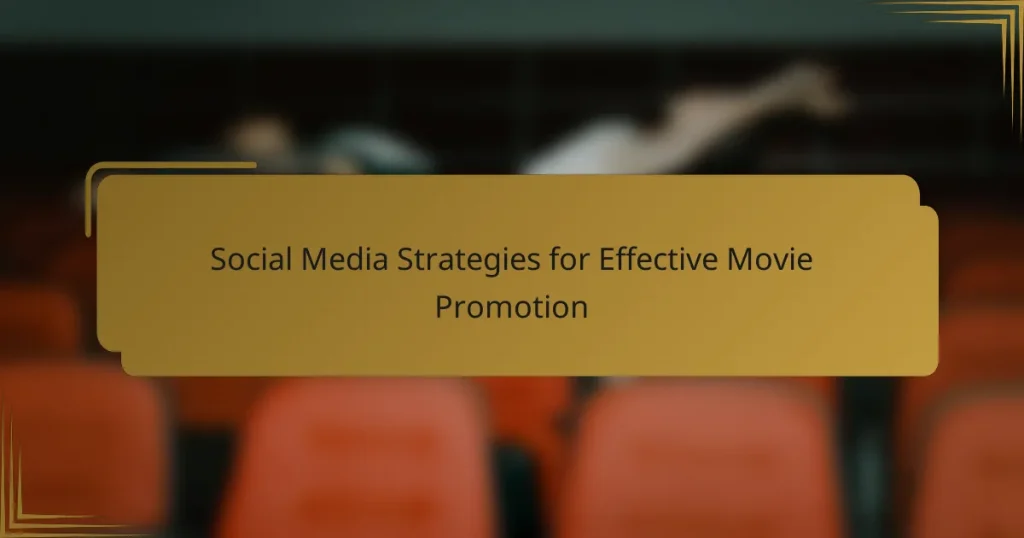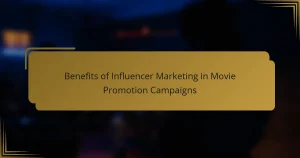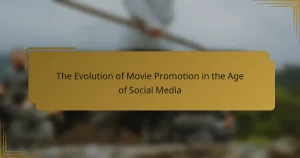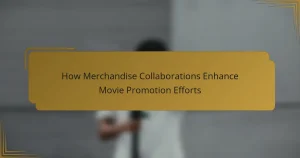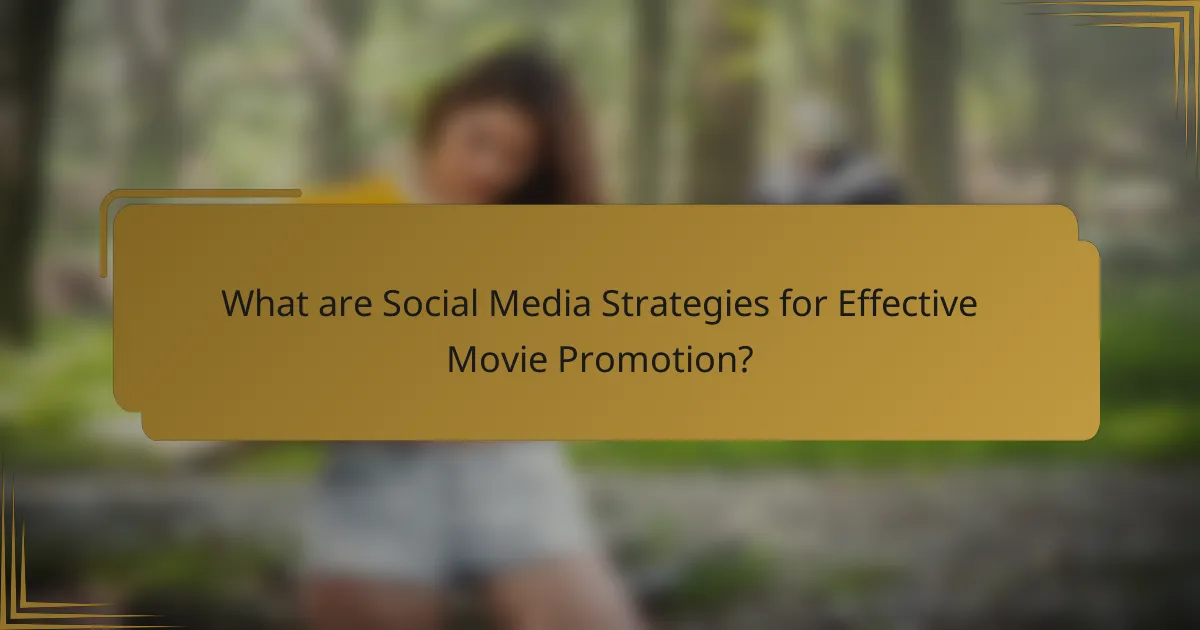
What are Social Media Strategies for Effective Movie Promotion?
Social media strategies for effective movie promotion include targeted advertising, engaging content, and influencer partnerships. Targeted advertising allows studios to reach specific demographics. For example, Facebook and Instagram ads can be tailored based on user interests. Engaging content, such as behind-the-scenes footage, trailers, and interactive posts, captures audience attention. Studies show that posts with videos generate 1200% more shares than text and images combined. Influencer partnerships leverage the reach of popular figures to promote the movie. Collaborating with influencers can increase visibility and credibility. Consistent updates and audience interaction build anticipation and community around the film. Overall, these strategies create a comprehensive approach to movie promotion on social media platforms.
How do social media strategies enhance movie visibility?
Social media strategies enhance movie visibility by creating targeted engagement with audiences. These strategies utilize platforms like Facebook, Instagram, and Twitter to reach specific demographics. They allow for the sharing of trailers, behind-the-scenes content, and promotional materials. Engaging content encourages user interaction, increasing organic reach. Paid advertising on these platforms can further amplify visibility. According to a study by the Pew Research Center, 69% of adults in the U.S. use social media, making it a crucial tool for reaching potential viewers. Hashtags and viral challenges can also generate buzz and discussions around a movie. Overall, effective social media strategies lead to increased awareness and anticipation for film releases.
What platforms are most effective for movie promotion?
Social media platforms are most effective for movie promotion. Facebook allows targeted advertising to specific demographics. Instagram’s visual nature engages audiences through trailers and behind-the-scenes content. Twitter facilitates real-time interaction with fans and trends. TikTok’s short videos create viral marketing opportunities. YouTube is essential for trailers and promotional content. Each platform enables unique engagement strategies that enhance movie visibility. Research indicates that 70% of moviegoers discover films through social media channels.
How do audience demographics influence strategy selection?
Audience demographics significantly influence strategy selection in social media marketing. Different age groups, genders, and interests dictate content type and platform choice. For instance, younger audiences may prefer TikTok or Instagram, while older demographics might favor Facebook. Understanding these preferences helps tailor messages that resonate. Research indicates that 71% of Millennials prefer visual content, making platforms like Instagram ideal for targeting this group. Additionally, gender influences purchasing decisions and content engagement. Women are more likely to engage with brands on social media compared to men. Thus, analyzing audience demographics ensures that marketing strategies align with the target audience’s preferences and behaviors. This alignment increases the effectiveness of promotional efforts.
Why is audience engagement crucial in movie promotion?
Audience engagement is crucial in movie promotion because it drives awareness and interest. Engaged audiences are more likely to share content, creating organic buzz. Research indicates that movies with strong social media engagement see a 20% increase in box office revenue. Engaging audiences fosters community, encouraging discussions and fan loyalty. It also allows filmmakers to gather feedback and adapt marketing strategies. Additionally, audience engagement can lead to user-generated content, amplifying promotional efforts. Overall, active engagement enhances visibility and connects the film with potential viewers.
What techniques can be used to boost audience interaction?
Engaging content is key to boosting audience interaction. Techniques include asking open-ended questions to encourage responses. Polls and surveys can effectively gather audience opinions. Live Q&A sessions create real-time engagement opportunities. User-generated content fosters community involvement and sharing. Contests and giveaways incentivize participation and increase reach. Additionally, using interactive visuals like quizzes can capture attention. Tailoring content to audience preferences enhances relevance and interaction levels.
How does user-generated content impact movie marketing?
User-generated content significantly enhances movie marketing by fostering audience engagement and building authenticity. It allows fans to create and share their own content related to a film, which can increase visibility and reach. According to a study by the American Marketing Association, campaigns featuring user-generated content can lead to a 20% increase in engagement rates. This type of content serves as social proof, making potential viewers more likely to trust the film’s marketing. Additionally, user-generated content can create a sense of community among fans, encouraging word-of-mouth promotion. Brands that incorporate user-generated content often see improved brand loyalty and consumer trust. Overall, leveraging user-generated content can lead to more effective movie marketing strategies.
What role does content creation play in social media strategies?
Content creation is essential in social media strategies as it drives engagement and brand awareness. Engaging content attracts audiences and encourages interaction. This interaction can lead to increased followers and a broader reach. Studies show that visual content is 40 times more likely to be shared than other types. Furthermore, consistent and relevant content helps establish a brand’s identity. For instance, movie promotions utilize trailers, behind-the-scenes footage, and interviews to create buzz. This strategy effectively builds anticipation for the release. In summary, content creation is a cornerstone of successful social media strategies, particularly in movie promotion.
What types of content resonate best with movie audiences?
Movie audiences resonate best with engaging and visually appealing content. Trailers and teasers create anticipation and excitement. Behind-the-scenes footage offers exclusive insights into the filmmaking process. Character interviews provide personal connections to actors and their roles. User-generated content, such as fan art or reviews, fosters community engagement. Interactive content like polls and quizzes increases audience participation. Memes and relatable content can enhance shareability on social media platforms. According to a 2021 survey by Statista, 61% of respondents preferred trailers as their primary content. This data underscores the effectiveness of visual and interactive content in capturing audience interest.
How can behind-the-scenes content enhance viewer interest?
Behind-the-scenes content can enhance viewer interest by providing exclusive insights into the filmmaking process. This type of content allows audiences to see the effort and creativity involved in movie production. It fosters a personal connection between viewers and the cast and crew. Research indicates that 60% of moviegoers feel more engaged after watching behind-the-scenes footage. This engagement can lead to increased anticipation for the film’s release. Furthermore, such content often reveals interesting anecdotes and challenges faced during production, making the film’s story more relatable. Overall, behind-the-scenes content serves to deepen viewer investment in the movie.
How can analytics improve social media strategies for movies?
Analytics can improve social media strategies for movies by providing data-driven insights. This data helps in understanding audience preferences and behaviors. By analyzing engagement metrics, studios can identify which content resonates most. For instance, tracking likes, shares, and comments reveals audience interests. Analytics also enables targeted advertising based on demographic data. This ensures promotional content reaches the right viewers. Moreover, sentiment analysis can gauge audience reactions to trailers and posts. Such insights guide adjustments in marketing strategies. Ultimately, leveraging analytics leads to more effective and tailored social media campaigns for movies.
What metrics should filmmakers track for effective promotion?
Filmmakers should track engagement metrics, reach metrics, and conversion metrics for effective promotion. Engagement metrics include likes, shares, comments, and video views. These metrics indicate how well the audience interacts with promotional content. Reach metrics measure the total number of unique users who see the content. This helps filmmakers understand the breadth of their audience. Conversion metrics track actions taken by users, such as ticket purchases or sign-ups for newsletters. These metrics directly correlate with the success of promotional campaigns. According to a study by Hootsuite, posts with higher engagement rates lead to increased visibility and audience retention. Tracking these metrics allows filmmakers to refine their strategies based on data-driven insights.
How can data insights shape future marketing campaigns?
Data insights can significantly shape future marketing campaigns by informing strategies and targeting. They allow marketers to understand audience preferences and behaviors. For instance, analyzing social media engagement can reveal which content resonates most with viewers. This data can guide the creation of tailored marketing messages. Furthermore, insights can help identify optimal times for campaign launches. By leveraging historical data, marketers can predict future trends and adjust their tactics accordingly. A study by HubSpot found that data-driven campaigns are 6 times more effective than those without insights. Thus, integrating data insights is crucial for maximizing campaign impact.
What are common pitfalls to avoid in movie promotion on social media?
Common pitfalls to avoid in movie promotion on social media include neglecting audience engagement. Failing to interact with followers can lead to decreased interest. Another pitfall is inconsistent branding across platforms. This can confuse potential viewers and weaken brand identity. Overloading followers with promotional content is also detrimental. Research shows that excessive self-promotion can lead to audience fatigue. Additionally, ignoring analytics can hinder campaign effectiveness. Monitoring engagement metrics is crucial for optimizing strategies. Lastly, not adapting content for different platforms can limit reach. Each social media platform has unique requirements that should be respected.
How can brands prevent backlash from poorly received content?
Brands can prevent backlash from poorly received content by conducting thorough audience research. Understanding the target audience’s preferences and values is essential. Brands should also establish a clear content approval process. This process should involve multiple stakeholders to ensure diverse perspectives are considered.
Additionally, brands can utilize A/B testing for content before a full launch. This method allows for adjustments based on audience feedback. Monitoring social media reactions in real-time can help brands respond swiftly to negative feedback. Engaging with the audience post-release can also mitigate backlash.
According to a study by the Pew Research Center, 64% of consumers expect brands to respond to their concerns on social media. This statistic highlights the importance of proactive communication.
What strategies can mitigate negative feedback online?
Engaging with negative feedback promptly can mitigate its impact online. Timely responses show that the entity values customer opinions. Acknowledging the issue demonstrates empathy and understanding. Offering solutions or compensation can help turn negative experiences into positive ones. Encouraging constructive dialogue can also foster community support. Monitoring feedback across platforms allows for timely interventions. Utilizing positive testimonials can overshadow negative comments. Finally, maintaining a consistent brand voice helps build trust and credibility.
What best practices should filmmakers follow for successful social media campaigns?
Filmmakers should engage their audience consistently across social media platforms. Regular posting maintains visibility and builds anticipation for projects. They should use high-quality visuals and behind-the-scenes content to attract attention. Engaging storytelling fosters emotional connections with potential viewers. Collaborating with influencers can expand reach and credibility. Filmmakers must also monitor analytics to understand audience preferences. Adjusting strategies based on data ensures content resonates effectively. Utilizing hashtags increases discoverability and connects with relevant conversations. These practices align with industry standards for successful social media campaigns.
How can consistency in branding enhance promotional efforts?
Consistency in branding enhances promotional efforts by creating a unified identity. A strong, consistent brand helps audiences recognize and remember a movie. This recognition can lead to increased engagement on social media platforms. According to a study by Lucidpress, consistent branding can increase revenue by up to 23%. Consistency builds trust and credibility, which are essential for attracting and retaining audiences. When branding elements like colors and messaging align, they reinforce the movie’s themes and values. This alignment encourages sharing and word-of-mouth promotion among viewers. Overall, consistent branding maximizes the impact of promotional campaigns.
What are effective ways to collaborate with influencers in movie marketing?
Effective ways to collaborate with influencers in movie marketing include identifying the right influencers, creating engaging content, and leveraging social media platforms. Identifying influencers who align with the movie’s genre and target audience is crucial. This ensures that the promotional efforts resonate with potential viewers. Creating engaging content involves developing unique campaigns that allow influencers to showcase the movie authentically. This can include behind-the-scenes access, interviews, or exclusive previews. Leveraging social media platforms helps maximize reach. Influencers can share content across various channels, increasing visibility. Statistics show that influencer marketing can yield up to 11 times higher ROI compared to traditional forms of marketing.
The main entity of this article is social media strategies for effective movie promotion. It explores various techniques, including targeted advertising, engaging content, and influencer partnerships, to enhance movie visibility and audience engagement. Key platforms for promotion, demographic influences on strategy selection, and the importance of content creation are discussed. The article also highlights the role of analytics in refining marketing efforts and outlines best practices for filmmakers to maximize their promotional impact on social media. Overall, it provides a comprehensive framework for leveraging social media in the film industry.
